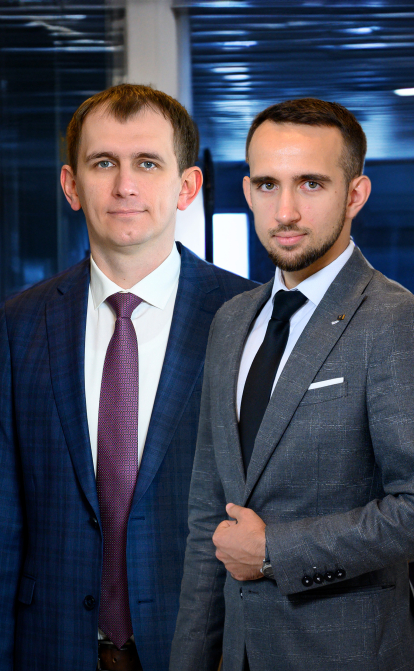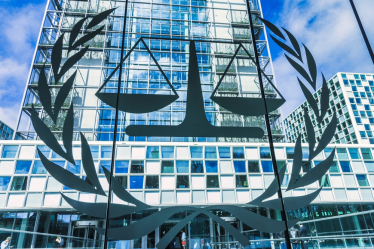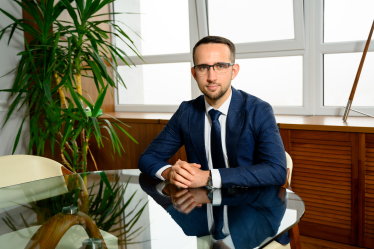As of December 31, 2023, the cost of reconstruction and recovery in Ukraine amounted to $486 billion, according to an analytical document compiled by the Government of Ukraine, the World Bank Group, the European Commission and the United Nations. A significant part of this amount is the losses incurred by Ukrainian business. It is not only about destroyed facilities, workshops, warehouses, but also about losses due to lost international partners, destruction of export chains, decrease in turnover, forced relocation
Under international and customary law, the injured party is entitled to compensation. Its source for Ukrainian business, which suffered from Russian aggression, is Russian assets in various formats. Not only in theory but also in practice, a company can receive a certain amount that will partially or fully cover the losses from the war started by Russia.
Lawyers with experience in resolving commercial disputes and cases in the fields of corporate, administrative and tax law, Andrii Nyzhnyi and Andrii Chornous, who are partners of the Ukrainian-British law firm Hillmont Partners, talked about the ways in which Ukrainian businesses can compensate for losses and receive compensation.

About Andrii Nyzhnyi*
Andrii Nyzhnyi specializes in the resolution of legal disputes and legal consulting, particularly in corporate law matters and the protection of clientsʼ interests. His expertise covers commercial and investment disputes, credit law, and business raiding protection. Andrii is a candidate of legal sciences, completed an internship under the International Visitor Leadership Program of the US State Department, and is an honored lawyer of Ukraine. With over 17 years of experience, Andrii has worked in the administrative court system, including the Supreme Administrative Court of Ukraine, as well as as a judge at a local general court. Currently, he is a senior partner of the law firm Hillmont Partners and the head of litigation practice.
*Information provided by the press service of Andrii Nyzhnyi

About Andrii Chornous*
Andrii Chornous specializes in international dispute resolution, in particular international commercial and investment arbitrations and cross-border litigation. His expertise includes the protection of the rights and interests of foreign investors and investments, assistance with international cooperative structuring, and business protection.
Andrii holds the degree of a Doctor of Philosophy in Law and completed graduate programs at the University of Oxford and Stanford Law School. In his professional activity, Andrii has experience representing parties in commercial and investment arbitrations and cross-border litigation at various stages, including the recognition and enforcement of arbitral awards in EU countries, England, and the USA.
*Data provided by the press service of Andrii Chornous
For what losses can Ukrainian businesses receive compensation?
Andrii Chornous: Ukrainian businesses suffered billions of dollars in losses from Russian military aggression. They are conditionally divided into two types: real losses caused as a result of hostilities or actions of the occupying power (destruction and capture of physical property and integral property complexes) and losses in the form of lost profit.
Andrii Nyzhnyi: The possibility of receiving compensation will depend not only on the specific type of damage caused but also on a set of other circumstances, such as the circumstances of the damage, the chosen method of protection, the availability of evidence, etc.
What ways of protection and recovery of compensation can a Ukrainian business that has suffered from the aggression of the Russian Federation use according to Ukrainian and international legislation?
A. C.: First of all, these are litigations, investment arbitrations and international compensation mechanisms. The difficulty of implementing a special compensation mechanism under the auspices of the UN lies in the fact that the Russian Federation is a permanent member of the UN Security Council with the right of veto. Therefore, it is almost impossible to repeat the success of the UN Commission on Compensation, created after the invasion of Kuwait by Iraq in 1990. The classic mechanism of reparations through the payment of reparations, which the world has already seen after 1945, is also still unrealistic. For this door to open, the aggressor state must lose the war and go for a peaceful settlement of the conflict, as it was, for example, after the First World War under the Treaty of Versailles.
Investment arbitrations are the most practical for business in compensating for damages caused by Russian aggression. Ukrainian businesses that have suffered losses can use this mechanism on the basis of the Agreement between Ukraine and the Russian Federation on the promotion and mutual protection of investments. This agreement states that Ukrainian entrepreneurs who have assets in the territory effectively controlled by Russia have the right to protect their investments and compensation for losses through independent tribunals. With a justification of damages and evidence confirming the actual amount of damages, claims can be filed in foreign tribunals. You can also apply to Ukrainian and foreign national courts and to the Commission for consideration of issues regarding the provision of compensation for damaged real estate objects, created with the support of the Council of Europe.
A.N.: An alternative way for businesses to fight for compensation is at the national level. However, in the context of appeals to both Ukrainian and foreign national courts, we have an issue. As a general rule, states have sovereign immunity from prosecution in the courts of another state, which is also reflected in our legislation. Therefore, courts in different countries of the world do not have the right to consider cases against any state, including the Russian Federation, with certain narrow exceptions. However, in April 2022, the Civil Cassation Court of the Supreme Court, made a decision that, in view of the crime of Russian aggression against Ukraine, allowed Ukrainian courts to ignore Russiaʼs sovereign immunity and consider lawsuits against it.
Therefore, I believe that the most promising way for the majority of businesses that suffered losses as a result of the war is the international compensation mechanism, which is currently being implemented based on the resolution of the Parliamentary Assembly of the Council of Europe. It provides for the possibility of compensation for various types of damages – from destruction and damage to property to damage due to loss of control over property or due to forced relocation of business. This mechanism rests on three pillars: the compensation fund, as a source of compensation; an international compensation commission, as a body that decides who will receive what compensation and under what rules, and an international register of losses, where business losses from Russian aggression are properly documented.
Can any business in Ukraine file a claim for compensation and receive it?
A. C.: Yes, any business can do so, regardless of sales, turnover, number of employees, capacity or region of Ukraine. However, it should be remembered that this process varies in duration and cost.
A.N.: Anyone who has suffered losses as a result of armed aggression can file a lawsuit or claim for compensation. But you need to understand that the path to actually receiving compensation will be long in any case.
Tell us about the time frame and costs that a business should be prepared for when choosing the announced methods of fighting for compensation?
A.N.: Letʼs go from the simple to the more complex. In Ukrainian courts, there is no court fee, cases are considered relatively quickly — from several months, and the costs of lawyersʼ services are affordable for almost everyone. Ukrainian judges willingly support Ukrainian businesses and refuse to grant a lawsuit only if there is no sufficient evidence of the damage caused. But then the question arises — what to do with the courtʼs decision, how to achieve its implementation and within what time it will be done: a year, five, ten?
As of today, the international compensation mechanism has started working only in the part of the damage register, to which individuals can submit an application for compensation for damage caused by damage or destruction of housing.
In the near future, applications from legal entities are expected to start to be accepted regarding compensation for damage caused to businesses, and the possible costs of legal services here should also be affordable for all interested parties.
Finally, investment arbitration holds the greatest promise in terms of completeness of redress but is not suitable for all situations and is the most expensive of all possible remedies.
A. C.: If you choose Ukrainian litigation, then you need to find a way to notify Russia, as the defendant, about it – this can be done through letters to its embassies outside Ukraine or by e-mail. But even after receiving a court decision from a civil or commercial court in Ukraine, the business will have the question of how to comply with it. The fact is that all of Russiaʼs assets in Ukraine are under sanctions, seized, or sold, so businesses will have little chance of obtaining this property in the execution of one of the thousands of decisions of Ukrainian courts. Accordingly, the question arises of implementing such a decision abroad, in countries friendly to Ukraine and unfriendly to Russia.
To enforce Ukrainian court decisions abroad, you need to attract foreign lawyers and be prepared to wait more than a year. First of all, it is necessary to understand which assets of the Russian Federation this decision can be implemented against. Assets that are not sovereign property can be alienated — that is, those that are not used for state purposes but for commercial purposes or commercial purposes prevail. Searching for such assets is a crucial stage for real recovery.
Could you formulate the top difficulties that await a business that is preparing to fight for compensation?
A. C.: The first difficulty is the scrupulous collection of evidence to confirm the infliction of damages. Legal documents that will confirm ownership of destroyed assets; statements of witnesses and experts who will confirm the amount of loss; video recording, which will confirm the fact of destruction and an independent assessment of damages — all this is required for both Ukrainian and international courts, as well as for international arbitration processes. In arbitration, for example, it is necessary to confirm the fact of presence of investments and property that was in the territory that was under the effective control of the Russian Federation. It was easier with the Crimean cases because Russia claimed in the world media that it is the owner of this territory. The situation around the so-called «DPR» and «LPR» is more difficult because these are quasi-formations with dubious sovereign immunity under the actual effective control of the Russian Federation.
The second is the dispute resolution proceedings. It is relatively straightforward if we are talking about national courts, and it is more complicated when we are talking about international arbitration — here, you need to engage international arbitration lawyers.
The third complexity is enforcement, that is, the tracing of assets that can be collected and used for compensation. No foreign court will search for recoverable state assets for you. In the meantime, Russia can spend millions of dollars to avoid enforcement of an unfavorable arbitral decision. In addition, it is rather unlikely that a settlement agreement will be reached with Russia, so a sufficient budget is needed to fight to the end and enforce the decision to seize Russian assets. There are successful arbitration cases in which tribunals awarded compensation for Ukrainian assets seized by Russia after the annexation of Crimea. For example, in the Naftogaz case, an investment arbitration decision was obtained in The Hague, and it is currently being enforced in the UK, U.S. and Europe.
It is economically expedient to fight for compensation through investment arbitration if the amount of losses reaches at least $10-15 million. Even if there are no funds for legal support of the arbitration proceedings, special foreign investment funds can be used to finance promising arbitration cases.
A.N.: And the fourth is the need to record not only the fact of damage and its size, but also, if possible, the cause-and-effect relationship — to prove that the damage was caused, for example, as a result of Russian shelling, and not the actions of the Armed Forces of Ukraine. The fact is that today there is no rule of law in Ukraine that would place responsibility for all damage caused by the armed aggression of the Russian Federation on the aggressor country. Under such circumstances, Ukrainian judicial practice is based on the general norms of tort liability, which provide for the need to prove a cause-and-effect relationship between the damage and the action by which such damage was caused.
Also, today it is impossible to fulfill the procedure established by the Hague Convention for the delivery of court documents abroad in civil or economic cases due to the lack of direct diplomatic relations and postal communication between Ukraine and the Russian Federation.
In such circumstances, it is necessary to demonstrate to the Ukrainian and, in the future, foreign courts of the countries where the enforcement on Russian property will be sought that the claimant have done everything possible to notify the appropriate Russian state agencies abroad.
For this purpose, e-mail addresses of appropriate Russian authorities can be used, as well as courier deliveries from countries neighboring Ukraine to diplomatic missions of the Russian Federation abroad.
Where should a Ukrainian business start in order to expect a positive result in compensation recovery cases?
A. C.: It is important to immediately understand which of the ways is realistic so as not to get bogged down in unnecessary expenses. When commencing, letʼs say, an investment arbitration, it is crucial to correctly assess the prospects of the case at the very start. This mechanism was created not to compensate for losses but to protect foreign investors from the illegal behavior of foreign states. However, in the event of a war, it is difficult to prove which territory was under the effective control of Russia at one point in time or another. This is confirmed by the decision of the European Court of Human Rights in the case of Georgia v. Russia that the essence of war is a competition for who will establish effective control over the territory and, obviously, there can be no effective control in the combat zone.
Therefore, only damages caused by the actions of the occupying power in the territories captured by it after their actual occupation and transition under the effective control of the aggressor country are subject to compensation within the limits of investor arbitration.
A.N.: The main actions that can and should be taken today are the formation of a high-quality evidential basis that would prove as fully as possible both the extent of the damage and the circumstances of its occurrence. It is also worth choosing the right method of compensation, taking into account the size of the losses, the circumstances of their occurrence, the assets of the aggressor country, at the expense of which it is intended to receive compensation, as well as the legal costs that will be required for a particular remedy.
Вы нашли ошибку или неточность?
Оставьте отзыв для редакции. Мы учтем ваши замечания как можно скорее.





